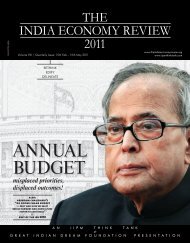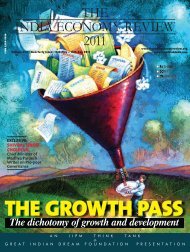Download - The India Economy Review
Download - The India Economy Review
Download - The India Economy Review
Create successful ePaper yourself
Turn your PDF publications into a flip-book with our unique Google optimized e-Paper software.
fl uence and give larger credit to the Nehru<br />
authored National Planning Committee<br />
of the Congress Party, history tells us a<br />
different story.<br />
So planned development indeed helped<br />
build <strong>India</strong>’s basic economic infrastructure<br />
and provided the crutches for accumulation<br />
of private capital through protectionist<br />
policies and various subsidies,<br />
it failed miserably with social sector development,<br />
primarily health and education.<br />
For example in the<br />
health sector the<br />
pharmaceuti-<br />
cal industry and medical education ben-<br />
efi ted from the planned development. <strong>The</strong><br />
pharma industry had protection through<br />
the patents policy with <strong>India</strong> rejecting<br />
product patents as well as massive subsi-<br />
dies through cheap basic chemicals being<br />
sold by public sector giants like Hindustan<br />
Antibiotics, Bengal Chemicals, IDPL etc.<br />
who perpetually were in the red not be-<br />
cause of their ineffi ciency but because of<br />
the subsidies via pricing of bulk drugs for<br />
formulation units which were predomi-<br />
nantly private sector. And medical<br />
education received huge subsidies<br />
through almost free education and<br />
the outturns mainly went to the<br />
private sector or worse still mi-<br />
grated abroad. <strong>The</strong> conse-<br />
quence of this was that the<br />
public health sector became<br />
the victim and private<br />
healthcare grew from<br />
strength to strength using<br />
the crutches provided by<br />
planned development.<br />
Today the public sector<br />
pharma industry has virtu-<br />
ally disappeared and In-<br />
dia’s private pharma capi-<br />
talists have become<br />
multi-nationals and global<br />
players. Similarly <strong>India</strong>n doctors<br />
rule the roost globally and within<br />
the country too are predominantly<br />
serving private capital, and worse still<br />
medical education is also increasingly<br />
becoming privatised and for the future<br />
this means even less human resources for<br />
D EVELOPMENTAL PLANNING<br />
the public sector. So this was not the fail-<br />
ure of <strong>India</strong>’s planned development of the<br />
health sector but it was planning for failure<br />
of the public health sector!<br />
<strong>Review</strong> of Health Planning<br />
in <strong>India</strong><br />
<strong>India</strong>n doctors rule the roost globally<br />
and within the country too are<br />
predominantly serving private capital<br />
<strong>India</strong>’s tryst with planning seriously for<br />
health began with the Bhore Committee<br />
Report. Prior to that under colonial rule<br />
the planning and provisioning was largely<br />
restricted for the civil lines of the British<br />
<strong>India</strong> territories and military enclaves.<br />
<strong>The</strong> four-volume Bhore Committee Report<br />
was submitted to the Government of<br />
<strong>India</strong> in 1946. It defi ned the following<br />
objectives for its plan for a National<br />
Health Service:<br />
1. <strong>The</strong> services should make adequate<br />
provision for the medical care of the<br />
individual in the curative and preventive<br />
fi elds and for the active promotion<br />
of positive health;<br />
2. <strong>The</strong>se services should be placed as<br />
close to the people as possible, in order<br />
to ensure their maximum use by the<br />
community, which they are meant to<br />
serve;<br />
3. <strong>The</strong> health organization should provide<br />
for the widest possible basis of cooperation<br />
between the health personnel<br />
and the people;<br />
4. In order to promote the development of<br />
the health programme on sound lines<br />
the support of the medical and auxiliary<br />
professions, such as those of dentists,<br />
pharmacists and nurses, is essential;<br />
provisions should, therefore, be<br />
THE INDIA ECONOMY REVIEW<br />
111





